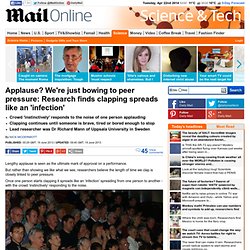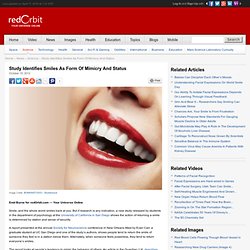

Applause? We're just bowing to peer pressure: Research finds clapping spreads like an 'infection' Crowd 'instinctively' responds to the noise of one person applaudingClapping continues until someone is brave, tired or bored enough to stopLead researcher was Dr Richard Mann of Uppsala University in Sweden By Nick Mcdermott Published: 00:29 GMT, 19 June 2013 | Updated: 09:40 GMT, 19 June 2013 Lengthy applause is seen as the ultimate mark of approval on a performance.

But rather than showing we like what we see, researchers believe the length of time we clap is closely linked to peer pressure. Once one person starts clapping it spreads like an ‘infection’ spreading from one person to another - with the crowd ‘instinctively’ responding to the noise. Smiles Mimic, Show Status. October 15, 2012 Enid Burns for redOrbit.com — Your Universe Online Smile, and the whole world smiles back at you.

But if research is any indication, a new study released by students in the department of psychology at the University of California in San Diego shows the action of returning a smile is determined by station and sense of security. A report presented at the annual Society for Neuroscience conference in New Orleans titled by Evan Carr, a graduate student at UC San Diego and one of the study’s authors, shows people tend to return the smile of someone they feel is in a station below them. Alternately, when someone feels powerless, they tend to return everyone’s smiles.
Psychology 2. Psychology 3. Psychology 4. The Placebo Effect.